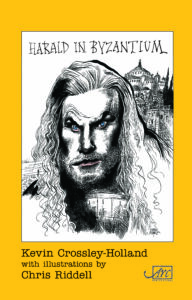HARALD IN BYZANTIUM
Published by ARC spring 2022
Harald Hardrada (née Sigurdsson) was the greatest warrior of his age.
He was only fifteen when he fought and was badly wounded at the battle of Stiklestad (1030). During the following fifteen years he served first as a young mercenary in Russia before joining the Varangian guard, the crack regiment who guarded the Emperors of Byzantium. He fought in Sicily and the Balkans and Asia Minor to preserve the porous Empire, escorted members of the royal family to Jerusalem, and won immense wealth, before returning in 1045 to Norway with his banner, Land-Waster, to contest and win the crown. He was killed in battle at Stamford Bridge in 1066.
Harald was a man of ferocious energy, burning ambition, and a sense of destiny, with an imposing physical appearance (he had a blonde beard and floppy moustache, one eyebrow was higher than the other, and he was ‘a full hand’s height taller than other men’). But for all his innate gifts, he had to learn how to be a leader, to understand how politics was largely a matter of attending to personal relationships, and to grasp matters of precedence and status. His defects, moreover, were scarcely fewer than his skills. He was cunning and cruel and vengeful.
Unsurprisingly, Harald was hugely attractive to women. The elderly Empress Zoe unsuccessfully tried to take him to bed; he had a clandestine and passionate affair with her niece, Maria; and Harald’s Saga tells us how other well-born women risked life and limb to spring him out of prison…
The cycle consists of short poems in the persona of Harald during his formative years in Byzantium. Passionate and decided, fierce and terse and I hope sometimes witty, they’re not narratives but revelations, turning on Harald’s engagement with warfare, leadership, love and the contrasts between the appearance and values of the glittering hard-edged northern world, still half in thrall to the old Norse gods, and the softer, more seductive south.
Above all, they’re the words of a young man amongst men (most of them blue-eyed and tattooed) whose lives are in his hands, and on whom his own success and fame depend.
GRAVITY FOR BEGINNERS
Kevin’s first collection of poems for six years was published by ARC on 1st April 2021
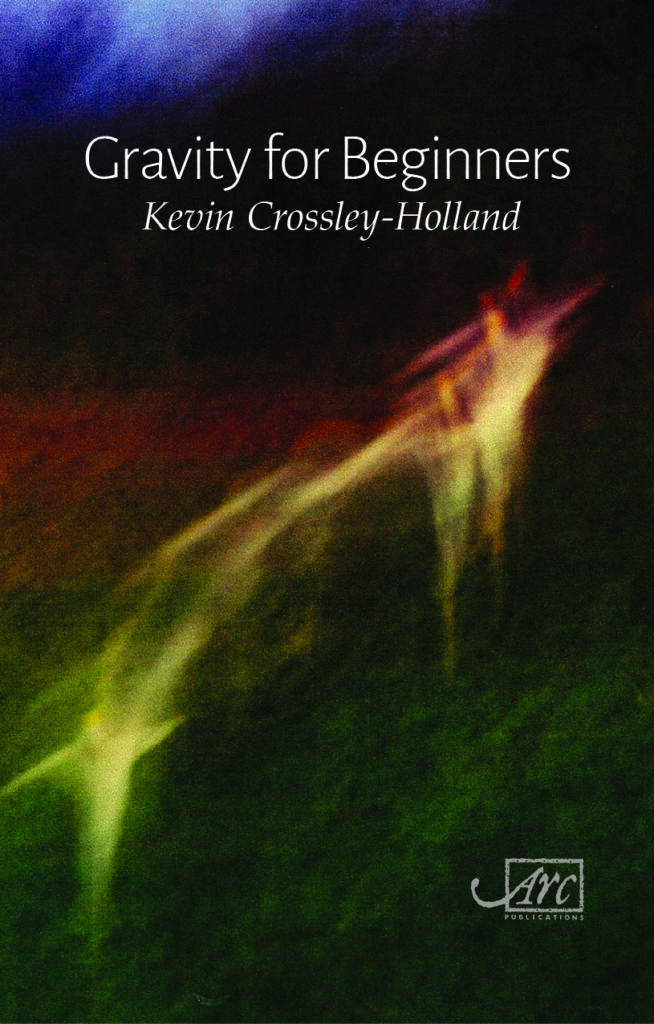
SACRAMENTAL
We could commit the whole day
to this heavenly squelch
beyond the muddy paths and sour pans
cracking into soft, salt-bleached
mosaics. We’d try to match
what Latin names we remember
to the bristle-and-cocoon footing
this ocean of musty sea-lavender:
(Shadow-sweep: a marsh harrier.)
Saltmarsh grass and sea blite,
samphire twigs, almost luminous;
stands of sea purslane and red fescue.
(Taste of silt and sharp iodine.)
Here’s a bone-house of sally crabs,
and a wicked witch’s purse,
spikes we’ve never seen before. . .
What happens in this all but silent space,
preceding thought, inviting it,
is never simple, always changing.
An oystercatcher’s kleeep. Sucks. Sighs.
Each sound or movement of what’s hidden
signifies. Look! This shining shrimp
– leaping opal! The word on the tip
of your tongue may be sacramental.
Review by Mandy Pannett, Tears in the Fence, 31st May 2021
the heart of everything […] returns to each of us, our very being, / woven into us. Kevin Crossley-Holland invites the reader to share in the essence behind the appearance, to see the landscape behind the words.”
See more…
Some of Kevin’s poems will be published in forthcoming editions of: Agenda , Smoke , Temenos Academy Review, Theology
SEAHENGE : A JOURNEY POEMS BY KEVIN CROSSLEY-HOLLAND, PHOTOGRAPHY BY ANDREW RAFFERTY
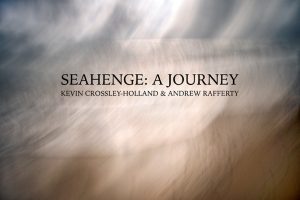 KAILPOT PRESS, 2019 £14.99
KAILPOT PRESS, 2019 £14.99
ISBN: 978-09556860-4-7
In this new sequence of poems, Kevin Crossley-Holland approaches Seahenge along the Icknield Way and Peddar’s Way from his childhood home in the Chilterns, and then adopts the persona of a woman who helps to build the timber circle and lay the body of her father within it. His words are brilliantly complemented by Andrew Rafferty’s daring landscapes, seascapes and skyscapes.
Together they enter the world of Seahenge’s creators and weave then and now, past and present, into something greater and more lasting than either.
Kevin Crossley-Holland is the featured poet in the December 2017 edition of RESURGENCE magazine, printing three poems from his Seahenge sequence, with photographs by Andy Rafferty.
It takes a pause in the familiar current of one’s consciousness to come to one’s accustomed place afresh and – as Eliot put it – ‘know the place for the first time’. It is that revisit, return, rediscovery that allows a synoptic vision of past and present, of surface and secret. To find the depth, you first have to depart whether it is achieved by allowing distracting detail to blur into a significant pattern. . . or by scraping through the covering of soil to recover the buried ancestral symbol. . . the ability to see the essence behind the appearance is an art in which Crossley-Holland has few, if any, equals. Grahame Davies
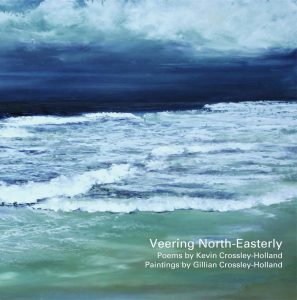 Veering North-Easterly, Poems by Kevin Crossley-Holland,Paintings by Gillian Crossley-Holland
Veering North-Easterly, Poems by Kevin Crossley-Holland,Paintings by Gillian Crossley-Holland
The Green Dragon Press (Diss), 2016 £10.00 ISBN: 9780993261701
Within sight and sound of the sea
This is a gorgeously produced publication, in which text and full colour paintings occupy equal space and status. A long painting stretches across front and back cover (After the Storm, Scolt Head) and the same canvas occupies the full breadth of the centre-fold pages. It is an astonishing picture, a troubled and troubling mixture of light and dark, the waves lapping white and gentle on a beach but the distant waters deep, dark blue; and the sky heavy and ominous.
Beside such imagery, the texts create their own verbal lights and darks, the sound and sight of the sea. It was sound that caught my interest in particular (though visual detail is equally important). In ‘French Leave’ three boys on a jetty are jostling one another towards a dare:
They can hear the punch, the pound,
distant, arhythmical, and the shingle
cracking.
These are wonderfully onomatopoeic words, following their own arhythmical impulses, and I can hear the pull and tug of the waves when I read them. But the poem that achieves most for me, sound-wise, is ‘The Tide, Rising’ which faces a painting titled Sea Study. August High Tide – a riot of waves and wind-blown surf. Of all the texts in the pamphlet this one most clearly adopts a metrical pattern, driving a stressed first syllable in each wave (I mean ‘foot’):
Dawn-dreep, shell-shine, heart’s tide rising –
Rumouring, memory, sheenskin ripple –
This reaches a high point in the fifth line with
Gossip and knock, knock, wave-whack, plunge –
You cannot read this quickly: the stressed syllables are too strong, and the last five of the line, to my ear, carry equal weight – a set of spondee.
Meanwhile, The painting opposite offers only a tiny strip of sand. The sea rears up and fills nearly two thirds of the square canvas: it is taking over. And the poem ends with the sound of that dominance:
Overlap, overrun, overcome, undermine –
The painting gives a visual reality; the poem makes its music. It’s a wonderful marriage of image and text.
Helena Nelson, SPHINX
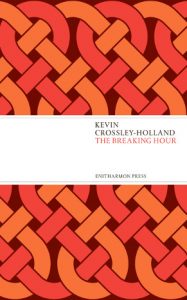
Kevin Crossley-Holland has written nine collections of poetry. His most recent collection The Breaking Hour was published by Enitharmon Press in spring 2015.
This is a book of meeting . A mother meets her baby. A man steps into his childhood. An old man encounters Godfather Death. And in the persona of Harald Hardrada, a passionate man wrestles with his fantasies, and north meets south. The Breaking Hour invokes Orpheus and Atargatis, Pierre de Ronsard and Beethoven, and moves from Hades to a hellish warzone, the high Alps and to the creeks and saltmarshes of his own beloved north Norfolk.
SEA-DEW
Open your heart to its slow roll
over – this vast spring tide driving
through the bellbuoys and mackerel shallows
from the flares of Forties and wild Viking,
at last first landing on Scolt Head.
White-caps along the foreshore are making merry.
And high on Chalk Hill the lane is milky,
wavy hedges and verges are shining
with sea-dew – foam of quickthorn, wild cherry,
nettles, cow parsley – and descants
and downpours blossoming before the dark.
But this is also a book turning on friendship, family, generations and memory – a book of layers, continuities and discontinuities, sometimes playful, sometimes prayerful, sometimes celebratory and sometimes elegiac, alive to the power of love, and of those transcendent times between times.
When the fret
lifts and the world grows wholly wonderful,
(and) we believe for a moment that we’ve levelled
our gaze and are singing in unison.
The Mountains of Norfolk was published by Enitharmon Press in early summer 2011 and won the EDP/Jarrold’s East Anglian Book Awards Prize for Poetry in 2012.
Written over almost forty years, his poems are notable for their perceptive and warm record of relationships, especially that of father and child; their powerful response to the landscape of Norfolk and Suffolk; and their awareness of historical and cultural continuities and dislocation. Sensuous, spare and forceful, many of his poems are also concerned with spiritual dimensions.
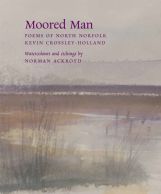 In 2006, Kevin published Moored Man:A Cycle of North Norfolk Poems with watercolours and etchings by the Royal Academician, Norman Ackroyd. These poems revolve around the mythical being who embodies the wilderness and warring elements of the north Norfolk saltmarshes.
In 2006, Kevin published Moored Man:A Cycle of North Norfolk Poems with watercolours and etchings by the Royal Academician, Norman Ackroyd. These poems revolve around the mythical being who embodies the wilderness and warring elements of the north Norfolk saltmarshes.
Ronald Blythe writes:
What enthralls us when we arrive at the coast is neither land nor sea but that narrow flux of both of them called the shore. It is the shore which does most of the talking, which utters, which we listen to. At first it seems to say the same things over and over again, and is mesmeric. Then it becomes both soothing and threatening, musical and dissonant, inspiring and wretched, easy to understand and complex as it articulates things which cannot be heard in any other place. Moored Man interprets this watery voice in a wonderful manner. In a sequence of wild, desperate, beautiful and original statements the seashore tells how it can never get away, how it has struggled in its liquid chains, and how it is both captive and yet free. Moored Man may be tied to the edge but he is never stationary. He is all movement. He may be mud-dull but yet he is a marvellous orator. Although below the rocks, he is a visionary. This is a fine poem. There is a tragic loneliness in it reminiscent of that in Ted Hughes’s Crow. Kevin Crossley-Holland’s Moored Man is the voice of that ultimate geography which separates land from water. He has listened to what it says for the best part of his life and is able to give us this exciting translation.
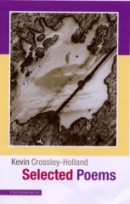
His poems give off as authentic a smell of East Anglia as do Crabbe’s, and, as with Crabbe’s, the beauty of language is hard-won. Peter Porter (Observer)
Crossley-Holland uncovers not only words but an entire landscape which haunts and is rich in echoes. Helen Dunmore (Observer)
These are poems to taste with the tongue and eye of the mind. Herbert Lomas (Ambit)
Kevin is the editor of The Oxford Book of Travel Verse. With Lawrence Sail, he edited The New Exeter Book of Riddles and the anthology of Christmas card poems, Light Unlocked.
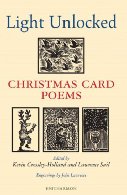
LIGHT UNLOCKED, Kevin Crossley-Holland’s and Lawrence Sail’s lovely anthology of Christmas card poems has just been reissued by Enitharmon Books. With poems by Alan Brownjohn, Seamus Heaney and many other leading poets with whom the editors have exchanged cards, this book is of course an ideal Christmas present, and has been praised by Sir Trevor MacDonald OBE as ‘… one of the most delightful anthologies to be published in years.’
He is the co-founder and sometime chairman of the annual festival of Poetry-next-the-Sea.
